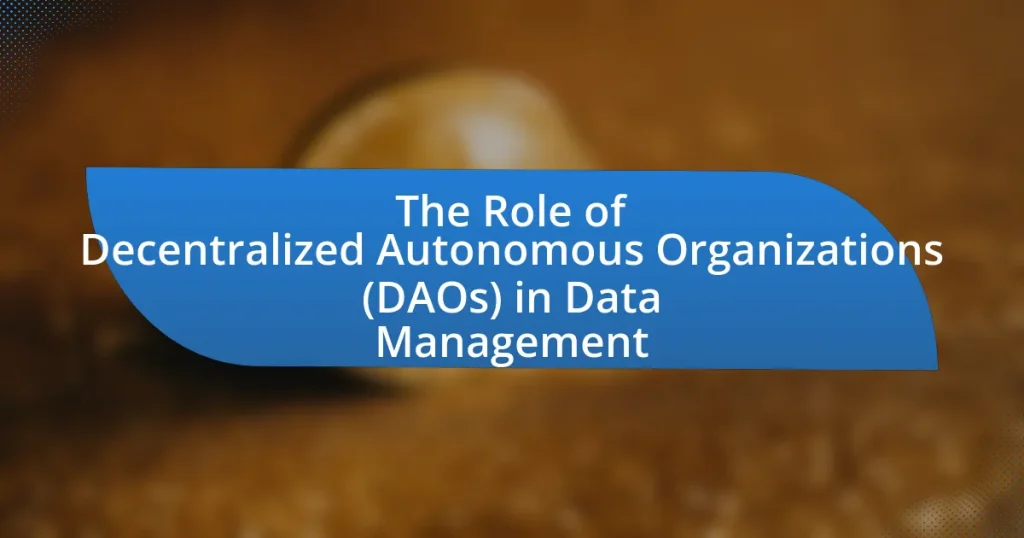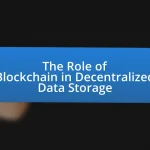Decentralized Autonomous Organizations (DAOs) are blockchain-based entities that facilitate collective decision-making through smart contracts, eliminating centralized control. This article explores the functionality of DAOs in data management, highlighting their governance structures, the role of smart contracts, and the advantages they offer, such as enhanced transparency, security, and efficiency. It also addresses the challenges DAOs face compared to traditional systems and outlines best practices for organizations looking to implement DAOs for effective data governance. Additionally, the article discusses future trends and innovations in DAO technology, including the integration of AI to further improve data management practices.
--Decentralized-Autonomous-Organizations-(DAOs-1.webp)
What are Decentralized Autonomous Organizations (DAOs)?
Decentralized Autonomous Organizations (DAOs) are blockchain-based entities governed by smart contracts, enabling collective decision-making without centralized control. DAOs operate through a set of rules encoded on the blockchain, allowing members to participate in governance and management through token-based voting mechanisms. This structure promotes transparency and democratizes control, as all transactions and decisions are recorded on the blockchain, ensuring accountability. DAOs have gained traction in various sectors, including finance and governance, exemplified by projects like MakerDAO and Aragon, which illustrate their potential to disrupt traditional organizational frameworks.
How do DAOs function in the context of data management?
Decentralized Autonomous Organizations (DAOs) function in data management by utilizing smart contracts on blockchain technology to automate decision-making and governance processes. This structure allows for transparent, secure, and efficient management of data without the need for centralized control. DAOs enable stakeholders to participate in data governance through voting mechanisms, ensuring that data management decisions reflect the collective input of the community. For instance, DAOs can manage access permissions, data sharing protocols, and compliance with regulations, all while maintaining an immutable record of transactions and decisions on the blockchain. This approach enhances accountability and trust among participants, as all actions are verifiable and traceable.
What are the key components of a DAO that influence data management?
The key components of a DAO that influence data management include governance structure, smart contracts, and community participation. Governance structure determines how decisions regarding data management are made, often through voting mechanisms that involve stakeholders. Smart contracts automate data handling processes, ensuring transparency and security in transactions. Community participation fosters collaboration and input from members, which can lead to more effective data management practices. These components collectively enhance the efficiency, security, and adaptability of data management within a DAO framework.
How do smart contracts facilitate data governance in DAOs?
Smart contracts facilitate data governance in DAOs by automating decision-making processes and enforcing rules without the need for intermediaries. They encode governance protocols directly into the blockchain, ensuring transparency and immutability of data management practices. For instance, smart contracts can automatically execute actions based on predefined conditions, such as approving data access or modifying data permissions, which enhances accountability among participants. This automation reduces the risk of human error and manipulation, as all actions are recorded on a public ledger, providing an auditable trail of governance activities.
What advantages do DAOs provide for data management?
Decentralized Autonomous Organizations (DAOs) provide several advantages for data management, including enhanced transparency, improved security, and increased efficiency. DAOs operate on blockchain technology, which ensures that all data transactions are recorded in an immutable ledger, making it easy to track changes and access historical data. This transparency fosters trust among stakeholders, as they can independently verify data integrity. Additionally, the decentralized nature of DAOs reduces the risk of data breaches, as there is no single point of failure. Furthermore, DAOs streamline data management processes by automating tasks through smart contracts, which can significantly reduce operational costs and time. These advantages collectively contribute to more reliable and efficient data management practices.
How do DAOs enhance transparency in data handling?
DAOs enhance transparency in data handling by utilizing blockchain technology, which allows all transactions and data interactions to be recorded in an immutable ledger accessible to all stakeholders. This transparency is further reinforced by smart contracts that automate processes and ensure compliance without the need for intermediaries. For instance, a study by the World Economic Forum highlights that the decentralized nature of DAOs eliminates single points of failure and reduces the risk of data manipulation, as every participant can verify the data independently. This collective oversight fosters trust among users and stakeholders, ensuring that data handling practices are open and accountable.
What role do DAOs play in ensuring data security?
Decentralized Autonomous Organizations (DAOs) play a crucial role in ensuring data security by utilizing blockchain technology to create transparent, immutable records of data transactions. This transparency reduces the risk of data tampering and unauthorized access, as all actions are recorded on a public ledger that can be audited by any participant. Furthermore, DAOs often implement smart contracts that automate security protocols, ensuring that data access is granted only under predefined conditions, thereby minimizing human error and enhancing overall data integrity. The decentralized nature of DAOs also means that there is no single point of failure, making it significantly harder for malicious actors to compromise the system.

How do DAOs impact traditional data management systems?
DAOs significantly impact traditional data management systems by introducing decentralized governance and transparency. Traditional systems often rely on centralized authorities for data control, which can lead to inefficiencies and vulnerabilities. In contrast, DAOs utilize blockchain technology to enable collective decision-making and automated processes, reducing the risk of data manipulation and enhancing trust among stakeholders. For instance, a study by the World Economic Forum highlights that DAOs can streamline data sharing and improve accountability through smart contracts, which execute predefined actions based on consensus. This shift not only democratizes data access but also fosters innovation by allowing diverse participants to contribute to data management without the constraints of traditional hierarchies.
What challenges do DAOs address in conventional data management?
Decentralized Autonomous Organizations (DAOs) address several challenges in conventional data management, primarily by enhancing transparency, reducing centralization, and improving data integrity. Conventional data management often suffers from issues like data silos, lack of accountability, and vulnerability to manipulation. DAOs utilize blockchain technology to create immutable records, ensuring that data is tamper-proof and accessible to all stakeholders. This transparency fosters trust among participants, as every transaction is recorded and verifiable. Furthermore, DAOs decentralize control, mitigating the risks associated with single points of failure and enabling collaborative decision-making, which enhances the overall reliability of data management systems.
How do DAOs improve efficiency in data processing?
Decentralized Autonomous Organizations (DAOs) improve efficiency in data processing by enabling automated decision-making and reducing the need for intermediaries. This automation streamlines workflows, minimizes human error, and accelerates data transactions. For instance, DAOs utilize smart contracts to execute predefined actions based on data inputs, which enhances processing speed and accuracy. According to a study by the World Economic Forum, organizations implementing DAOs reported a 30% increase in operational efficiency due to reduced administrative overhead and faster consensus mechanisms.
What limitations do DAOs face compared to traditional systems?
DAOs face limitations such as regulatory uncertainty, scalability issues, and governance challenges compared to traditional systems. Regulatory uncertainty arises because DAOs operate in a legal gray area, making compliance with existing laws difficult. Scalability issues stem from the reliance on blockchain technology, which can struggle with high transaction volumes, leading to slower processing times. Governance challenges occur due to the decentralized nature of DAOs, which can result in decision-making inefficiencies and conflicts among stakeholders. These limitations hinder DAOs’ ability to function as effectively as traditional organizations in certain contexts.
How can organizations implement DAOs for data management?
Organizations can implement Decentralized Autonomous Organizations (DAOs) for data management by establishing smart contracts on blockchain platforms that automate data governance and access control. This approach allows organizations to create transparent, tamper-proof records of data transactions, ensuring accountability and traceability. For instance, using Ethereum’s smart contract capabilities, organizations can define rules for data sharing and permissions, enabling stakeholders to interact with data securely and efficiently. Furthermore, DAOs facilitate community-driven decision-making, allowing stakeholders to vote on data management policies, which enhances collaboration and aligns data practices with collective interests.
What steps are necessary to establish a DAO for data governance?
To establish a DAO for data governance, the necessary steps include defining the governance structure, selecting a blockchain platform, creating smart contracts, establishing a tokenomics model, and engaging the community for participation.
Firstly, defining the governance structure involves outlining the decision-making processes and roles within the DAO, ensuring transparency and accountability. Secondly, selecting a blockchain platform, such as Ethereum or Polkadot, is crucial for hosting the DAO and enabling smart contract functionality.
Next, creating smart contracts automates governance processes and enforces rules without intermediaries. Establishing a tokenomics model is essential for incentivizing participation and aligning interests among stakeholders. Finally, engaging the community fosters collaboration and ensures that the DAO reflects the collective interests of its members, which is vital for effective data governance.
These steps are supported by the increasing adoption of DAOs in various sectors, demonstrating their potential for decentralized decision-making and governance.
How can organizations ensure compliance with regulations when using DAOs?
Organizations can ensure compliance with regulations when using Decentralized Autonomous Organizations (DAOs) by implementing robust governance frameworks that align with legal standards. These frameworks should include clear protocols for decision-making, transparency in operations, and adherence to data protection laws such as GDPR or CCPA.
For instance, organizations can establish smart contracts that automatically enforce compliance rules, ensuring that all transactions and data handling processes meet regulatory requirements. Additionally, regular audits and assessments can be conducted to evaluate compliance and identify potential risks.
Research indicates that organizations that integrate compliance mechanisms into their DAO structures are better positioned to navigate regulatory landscapes, as evidenced by case studies of successful DAOs that have maintained legal adherence while operating in complex environments.

What are the future trends of DAOs in data management?
Future trends of DAOs in data management include increased automation, enhanced data privacy, and improved governance structures. Automation will streamline data processes through smart contracts, reducing human error and increasing efficiency. Enhanced data privacy will be achieved through decentralized storage solutions, allowing users to control their own data without relying on centralized entities. Improved governance structures will enable more democratic decision-making, as stakeholders can participate in protocol changes and data management policies through voting mechanisms. These trends are supported by the growing adoption of blockchain technology, which facilitates transparency and security in data management practices.
How might DAOs evolve in response to emerging data challenges?
DAOs may evolve by integrating advanced data governance frameworks to address emerging data challenges. As data privacy regulations tighten globally, DAOs can implement decentralized protocols that ensure compliance while maintaining transparency. For instance, the General Data Protection Regulation (GDPR) necessitates stringent data handling practices, prompting DAOs to adopt smart contracts that automate compliance checks and user consent management. Additionally, the rise of data ownership concerns can lead DAOs to develop decentralized identity solutions, empowering users to control their data and share it selectively. This evolution is supported by the increasing adoption of blockchain technology, which provides immutable records and enhances trust in data transactions.
What innovations are expected in DAO technology for data management?
Innovations expected in DAO technology for data management include enhanced data governance through smart contracts, improved transparency via decentralized ledgers, and automated compliance mechanisms. Smart contracts facilitate self-executing agreements that ensure data integrity and access control, reducing the need for intermediaries. Decentralized ledgers provide an immutable record of data transactions, increasing trust among stakeholders. Additionally, automated compliance mechanisms can adapt to regulatory changes in real-time, ensuring that data management practices remain compliant with evolving laws. These innovations are supported by the growing adoption of blockchain technology, which underpins DAOs and enables secure, efficient data management solutions.
How will the integration of AI and DAOs shape data governance?
The integration of AI and DAOs will significantly enhance data governance by automating decision-making processes and ensuring transparency in data management. AI algorithms can analyze vast amounts of data to identify patterns and make informed decisions, while DAOs provide a decentralized framework that allows stakeholders to participate in governance without centralized control. This combination fosters accountability, as all actions taken by the DAO can be recorded on a blockchain, ensuring traceability and reducing the risk of data manipulation. For instance, a study by the World Economic Forum highlights that the use of AI in conjunction with blockchain technology can improve data integrity and security, thereby reinforcing trust among users.
What best practices should organizations follow when utilizing DAOs for data management?
Organizations should implement transparency, community governance, and robust security protocols as best practices when utilizing DAOs for data management. Transparency ensures that all stakeholders can access and verify data processes, fostering trust and accountability. Community governance allows for collective decision-making, which can lead to more democratic and effective data management practices. Robust security protocols, including encryption and regular audits, protect sensitive data from breaches and unauthorized access, ensuring compliance with regulations. These practices are essential for maximizing the effectiveness and reliability of DAOs in managing data.
It is not possible to answer the question “
” as it does not provide a specific inquiry or context related to the topic of Decentralized Autonomous Organizations (DAOs) in Data Management.


